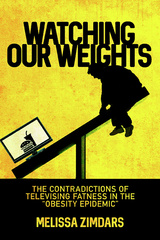Our shopping cart is currently down. To place an order, please contact our distributor, UTP Distribution, directly at utpbooks@utpress.utoronto.ca.
Obesity
Cultural and Biocultural Perspectives
SERIES:
Studies in Medical Anthropology
Rutgers University Press
In a world now filled with more people who are overweight than underweight, public health and medical perspectives paint obesity as a catastrophic epidemic that threatens to overwhelm health systems and undermine life expectancies globally. In many societies, being obese also creates profound personal suffering because it is so culturally stigmatized. Yet despite loud messages about the health and social costs of being obese, weight gain is a seemingly universal aspect of the modern human condition.
Grounded in a holistic anthropological approach and using a range of ethnographic and ecological case studies, Obesity shows that the human tendency to become and stay fat makes perfect sense in terms of evolved human inclinations and the physical and social realities of modern life. Drawing on her own fieldwork in the rural United States, Mexico, and the Pacific Islands over the last two decades, Alexandra A. Brewis addresses such critical questions as why obesity is defined as a problem and why some groups are so much more at risk than others. She suggests innovative ways that anthropology and other social sciences can use community-based research to address the serious public health and social justice concerns provoked by the global spread of obesity.
Grounded in a holistic anthropological approach and using a range of ethnographic and ecological case studies, Obesity shows that the human tendency to become and stay fat makes perfect sense in terms of evolved human inclinations and the physical and social realities of modern life. Drawing on her own fieldwork in the rural United States, Mexico, and the Pacific Islands over the last two decades, Alexandra A. Brewis addresses such critical questions as why obesity is defined as a problem and why some groups are so much more at risk than others. She suggests innovative ways that anthropology and other social sciences can use community-based research to address the serious public health and social justice concerns provoked by the global spread of obesity.
Around the globe, there are more overweight than underweight people, and trends indicate that obesity is reaching epidemic toward pandemic proportions. Drawing on extensive original research, integrating previous scholarship, and using a bio-cultural perspective, Brewis offers a wide-ranging exploration of obesity as a contemporary public health and social issue. Highly recommended.
Brewis provides a much-needed and insightful analysis of the current obesity 'epidemic' and the role that culture plays in the causes and consequences of having a fat body. Brewis provides a great resource for teaching about a seemingly intractable issue in public health nutrition.
This book provides the reader with a unique opportunity to examine obesity through cultural lenses.
Obesity is well written in a clear and jargon-free style. Brewis's expertise in this are shines through and I learned many new things about something I have been studying closely for over a decade.
ALEXANDRA A. BREWIS is a professor in the School of Human Evolution and Social Change at Arizona State University where she teaches anthropology and directs the Center for Global Health.
List of Figures
List of Tables
Preface
Acknowledgements
1 Introduction: The Problem of Obesity
2 Defining Obesioty
3 Obesity and Human Adaptation
4 The Distribution of Risk
5 Culture and Body Ideals
6 Big-Body Symbolism, Meanings, and Norms
7 Conclusion: The Big Picture
Appendix A: Global Rates of Overweight and Obesity
Appendix B: Body Mass Index Tables
Appendix C: Tools for the Comparative Study of Body Image
Appendix D: Using Cultural Consensus Alaysis to Understand Obesity Norms
References
Index
List of Tables
Preface
Acknowledgements
1 Introduction: The Problem of Obesity
2 Defining Obesioty
3 Obesity and Human Adaptation
4 The Distribution of Risk
5 Culture and Body Ideals
6 Big-Body Symbolism, Meanings, and Norms
7 Conclusion: The Big Picture
Appendix A: Global Rates of Overweight and Obesity
Appendix B: Body Mass Index Tables
Appendix C: Tools for the Comparative Study of Body Image
Appendix D: Using Cultural Consensus Alaysis to Understand Obesity Norms
References
Index





